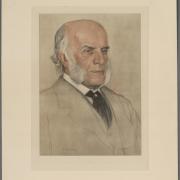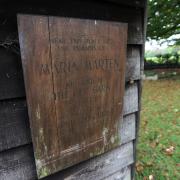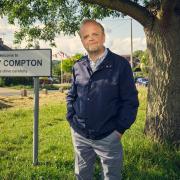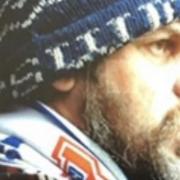Far from her Suffolk home, on the other side of the world, Esther Rutter suffered a mental breakdown. Poets came to her rescue and now she’s rebuilding her life as a successful author.
Books have always been important to author Esther Rutter. Slim volumes of Suffolk stories intrigued her as a child and she pored over classics in literature at university.
More recently, she's published her own two works of memoir. But when Esther was seriously ill in her twenties, it was what her mother was reading that held the key to her recovery.
Esther was teaching overseas, but returned to Suffolk after a mental breakdown. Sent home under escort as a medical emergency, she was bewildered by what had happened. Her parents had no idea what to do to help.

‘I had a medical discharge to travel but all the documents were in Japanese because that’s where I had been sectioned,’ says Esther. ‘It was only when my mum heard Book of the Week on the radio, and thought it sounded like my experience, that she knew what to do.’
The book was called Sunbathing in the Rain by the Welsh poet Gwyneth Lewis. Esther believes it was ‘the book that changed my life’. The racing thoughts, lack of self-belief and bleak outlook on life described in the book were things Esther was experiencing at the time, and she came to discover that her illness had been building over many years.
When Esther was a child, her parents went through bankruptcy and family separation. Then, as a student, she stepped into the intense environment of Oxford University. ‘I would work really, really hard, and stay up all night and party, and then get up and do it all over again.

'I didn’t know how to be an adult, managing your rest and your energies, and making decisions that are right for you. Usually people can work that out without a mental breakdown.’
After university she went to Japan to teach English. She'd always had a desire to travel, and had a basic grasp of the language and a love of the culture. But this new challenge proved too much and Esther was only prevented from attempting suicide by teaching staff who saw her struggle.
Back in Suffolk, embraced by her family, Esther started therapy and, with her mother’s encouragement, began writing about her thoughts and feelings. She first published an essay about that time in her life in 2010, but now she has released a more complete story, a book called All Before Me.
It's an honest, gentle, uplifting and beautifully lyrical account that combines memoir with literary history and travelogue. Esther describes her childhood, youth and early adulthood, while also exploring the importance of place, and the strength and wisdom she discovered in the life and work of the poet William Wordsworth.
Recuperating from breakdown, Esther applied to become an intern at Dove Cottage, a visitor attraction and the former home of William and Dorothy Wordsworth, in the Lake District, far away from Suffolk. It proved a turning point, bringing her understanding and healing. It was also where she met her husband.

Wordsworth and his sister made their home at Dove Cottage in a response to the dislocation they experienced during their childhood. In one of his greatest works, The Prelude, Wordsworth explored how reflecting on early childhood can bring something nourishing and valuable. Learning this helped Esther to come to terms with her own early upbringing.
‘There was a lot of financial instability growing up,’ she says. Her father, despite leaving school at 14, trained to become an engineer. After working in foundries, he designed and made his own motorcycles, and raced them all over the world. But the business failed and he was declared bankrupt. The family lost their home and from then on money was tight.
‘But my parents wanted me to have opportunities,' says Esther, 'so Mum would write to different charities so that I could go on school trips.’ Though her parents sought to protect Esther and her two younger brothers from the situation, the couple did separate. Esther now sees how that time affected her.
However, the family bond and sense of place remain strong; though she's now living in Scotland, Esther is still drawn to Suffolk.
‘Childhood gave me a real sense of connection with the landscape,’ she says. ‘I felt very embedded in Suffolk. My dad’s family have been agricultural labourers here since at least the 17th century, and my dad worked as a gardener, so he had that real rootedness in the soil of Suffolk. He’s a proper old Suffolk boy.

‘He is a fantastic storyteller; all his family are. And they’re very close. I heard all the family stories and had a real sense of belonging, growing up. I appreciated that being from Suffolk was interesting and special, and a bit different.’
Esther embarked on All Before Me during the Covid pandemic, when she couldn’t return to her family in Suffolk, or the Lake District. ‘I started revisiting places in my head. I drew on my memories of being at Dove Cottage and got a lot of strength from them,’ she says. But with two young children, she's conscious of how far she is from the support of her mother.
‘It’s hard without family nearby to help with the children, and I am an outsider in Scotland because I don’t have the same accent or cultural background. That is quite an interesting perspective for a writer, though. It allows you to look more objectively at what’s happening around you.
Esther knows that to maintain her mental wellbeing she needs new challenges and mental stimulation; her life sounds full and busy. She's combining motherhood with writing books and films – and lots of knitting. Indeed, she wrote about the tradition of knitting in an acclaimed memoir called This Golden Fleece and a book of knitting patterns is planned for later this year.
'And I have a desire to find out about new places and have new adventures. I don’t think I’m ready yet to stay put in my life. I don’t know whether I ever will be.’
All Before Me: A Search for Belonging in Wordsworth’s Lake District is published by Granta.




























